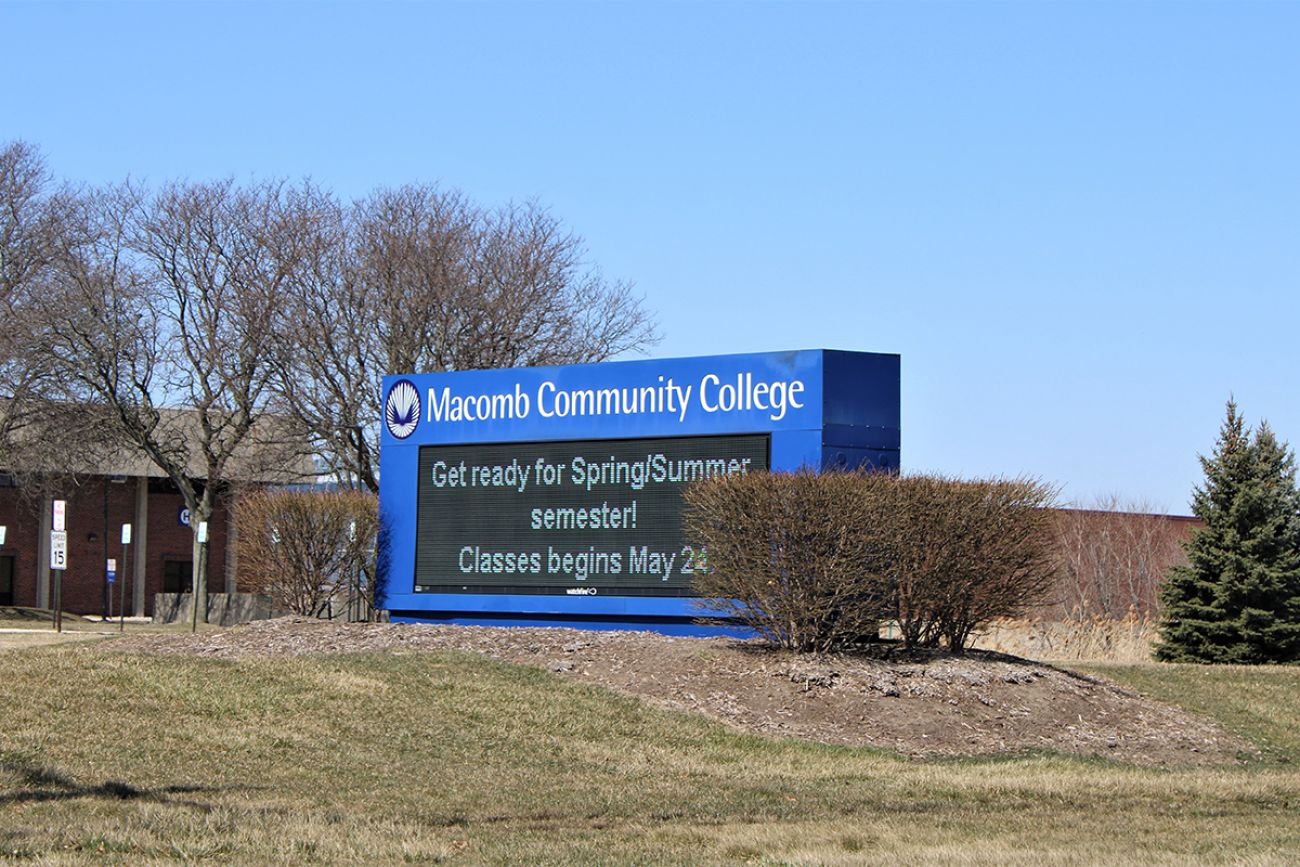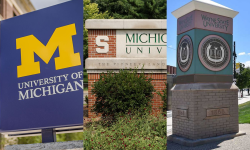Ballmer and Wilson groups give $30M to metro Detroit community colleges

- Two philanthropic groups are giving more than $30 million to Southeast Michigan community colleges
- Leaders say the investment will help increase affordability and access for students
- It’s part of a broader initiative to increase the number of Michiganders with skills certificates or college degrees
Two groups will be investing more than $30 million in seven metro Detroit community colleges to get more students into and through college and connect them to area employers.
The Ballmer Group and the Ralph C. Wilson, Jr. Foundation announced Monday they will invest in a three-year program with the Detroit Regional Chamber’s Detroit Drives Degrees Community College Collaborative (D3C3).
The collaborative’s three goals are to increase enrollment and community college completion rates, increase the ability of high school students to access college-level courses, and build strong partnerships with employers for talent development and skills training.
Related:
- These low-income Michigan schools get students into college. Here’s how.
- Micro-grants and life credits: How Michigan is reducing barriers to college
- More options for cheaper college if Michigan students fill out free form
“It's not simply a matter of increasing the number of students who attend college,” Oakland Community College Chancellor Peter Provenzano, Jr. said. “How we do this is by ensuring that the on ramp to more degrees is accessible, is affordable and achievable.”
The seven community colleges are: Henry Ford College, Macomb Community College, Monroe County Community College, Oakland Community College, Schoolcraft College, Washtenaw Community College and Wayne County Community College District. Each school will use its funds differently but will aim to reduce barriers to students attending and completing college.
“Right now, we know that there are major racial and socioeconomic gaps in degree attainment throughout our region,” Ballmer Group Portfolio Manager Kayla Roney Smith said. “And that does not have to be the case. And so we have the opportunity here, we feel, to really change what has for too long been accepted as the status quo.”
The Southeast Michigan investment comes as both regional and state leaders are trying to bridge the gap between what employers need and the skills workers have. Lawmakers recently approved a new state scholarship program to help the high school class of 2023 and beyond attend a community college, a skills training program, or public or independent nonprofit college or university in Michigan.
Gov. Gretchen Whitmer is aiming to increase the rate of working age adults having a college degree or skills certificate from about 50.5 percent to 60 percent by 2030 (what she has labeled as the Sixty by 30 Program). She is calling on the legislature to expand eligibility for a free community college program to more adults. Last fall, Whitmer told Bridge she wants to work on “increasing and improving” college completion rates.
David Egner, president and CEO of the Ralph C. Wilson, Jr. Foundation, said he envisions the foundation’s investment as “round one.”
“We could very quickly go to round two,” Egner said. “And some of this will also depend on what happens at the policy level at the state. So how will 60 (by) 30 work? What will the investments be coming from the state of Michigan? So this will be in a dynamic state of evolution for this three years and beyond.”
[Disclosure: The Ralph C.Wilson, Jr. Foundation is a funder to The Center for Michigan, Bridge Michigan's parent organization. It had no role in the selection, reporting, or editing of this report.]
Egner described how his parents and grandfather went through training for their specific jobs.
“Today is a very different game,” Egner said. “Vocational ed is not working at the pace it should have. We have not exposed pathways to the jobs the way we used to. And we have this glaring chasm between the demand of today's jobs and the future jobs and the understanding of students on how to get on the track and the path to get over that chasm to those jobs.”
Egner said the new investment will provide dual enrollment programs, employer partnerships and student “success and completions that didn’t exist before.”
Henry Ford College President Russ Kavalhuna told Bridge his school’s almost $5 million grant will help hire more student advisers and coaches, a recruiter to speak to adults with some college but no degree, and staffers to help identify students when they have a hardship like an unexpected car repair bill or caregiving responsibility.
“In the last 10 years we've gotten better at and focused resources into getting more students into the pipeline,” Kavalhuna said. “And now we're focusing on fixing the leaks in that pipeline: when students get into higher education but don't get through on the other side, which is a certificate, a diploma and a better life usually by transfer to a four-year-institution or a meaningful career.”
Schoolcraft College, in Livonia, will receive $4.4 million in grant funds, according to a news release. The school said it will use the funds to invest in its automotive electronics programs, strengthen and expand connections with K-12 schools, and expand its student success model. The model aims to remove barriers for underserved populations and students who are not the traditional age for college.
Washtenaw Community College said it will use its $2.09 million grant to serve 300 Ypsilanti Community Schools high school students and adults from Ypsilanti, the school said in a news release. The Advance Ypsi program will train and prepare participants for careers with an earning potential of at least $40,000.
The program will launch this fall and focus on careers in “mobility-focused transportation, manufacturing and IT sectors.”
Michigan Education Watch
Michigan Education Watch is made possible by generous financial support from:
Subscribe to Michigan Health Watch
See what new members are saying about why they donated to Bridge Michigan:
- “In order for this information to be accurate and unbiased it must be underwritten by its readers, not by special interests.” - Larry S.
- “Not many other media sources report on the topics Bridge does.” - Susan B.
- “Your journalism is outstanding and rare these days.” - Mark S.
If you want to ensure the future of nonpartisan, nonprofit Michigan journalism, please become a member today. You, too, will be asked why you donated and maybe we'll feature your quote next time!





